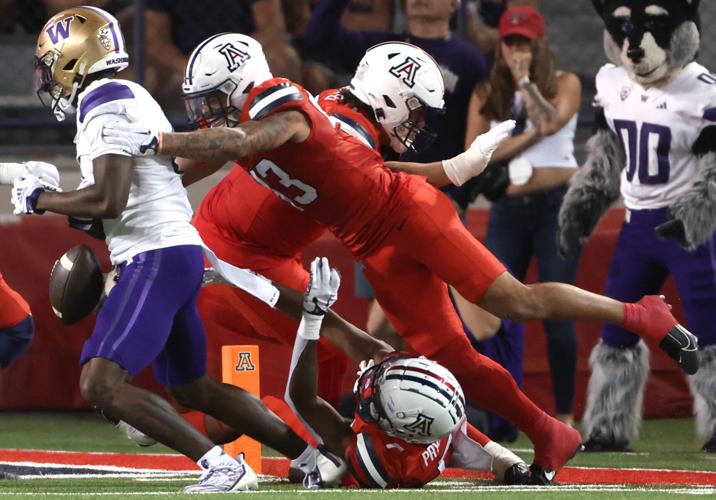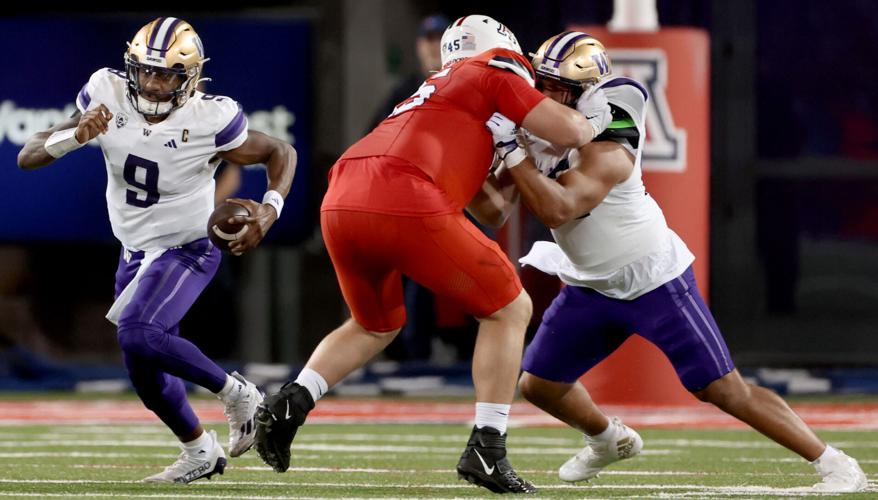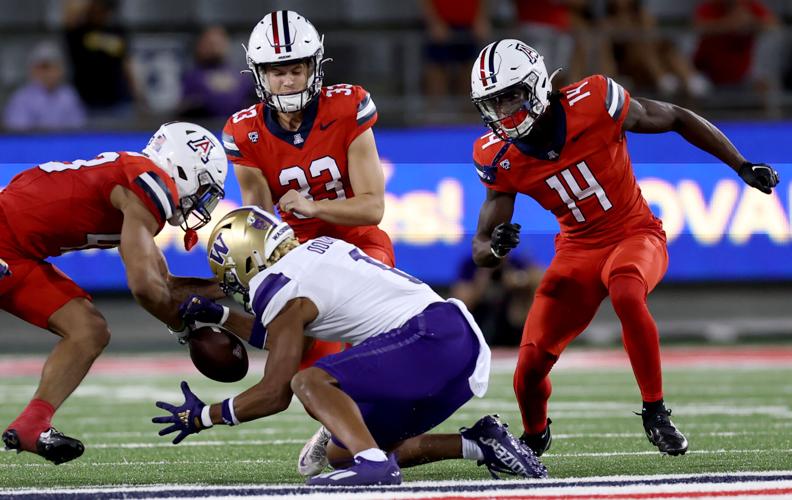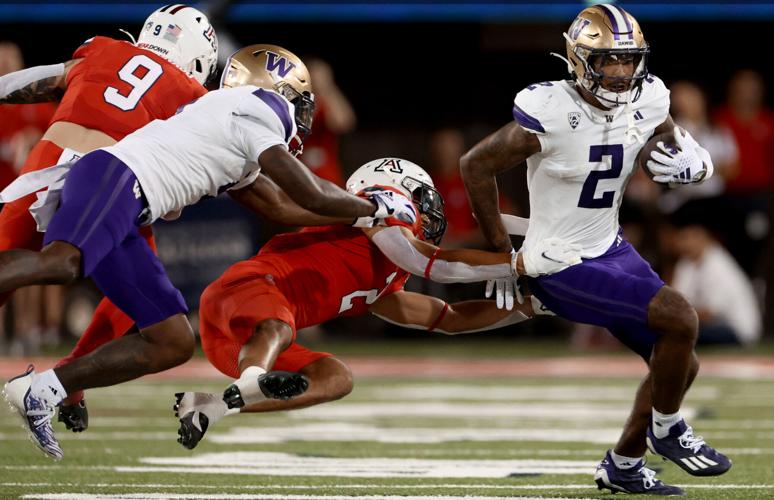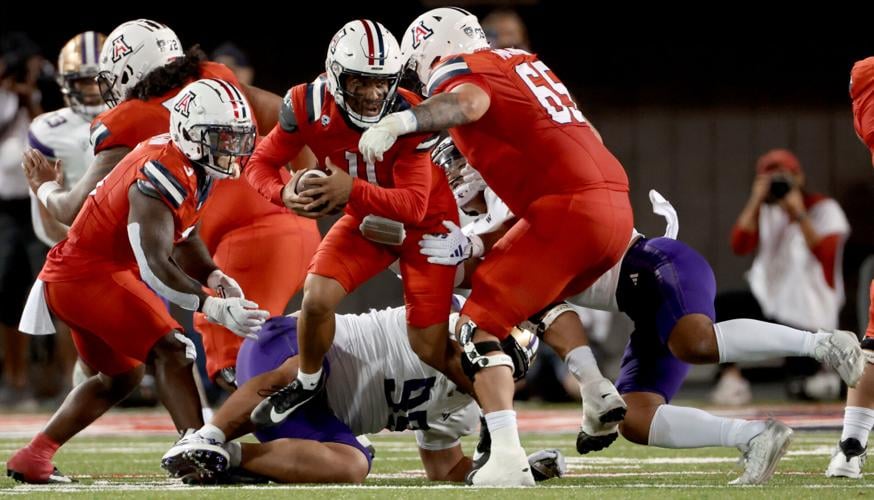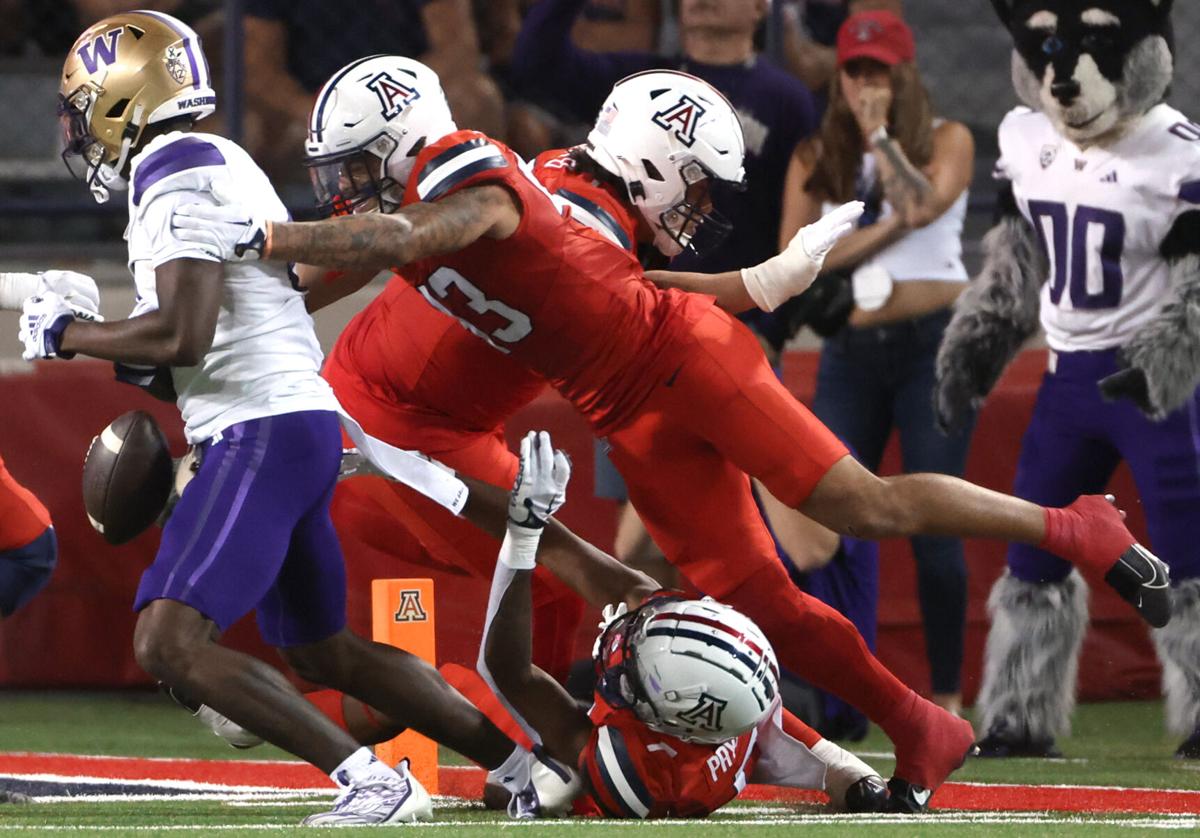Arizona played No. 7 Washington better than anyone had.
But the Wildcats didn’t win during a stage of their build when moral victories aren’t supposed to be acceptable anymore.
So how do we assess Washington 31, Arizona 24? Not bad? Or not good enough?
That’ll be the first subject we tackle in this week’s five takeaways following a compelling, competitive ballgame Saturday night at Arizona Stadium.

Michael Lev is a senior writer/columnist for the Arizona Daily Star, Tucson.com and The Wildcaster.
1. On the verge
We don’t usually lead off with big-picture thoughts, but this result merits such reflection.
Consider the following: Washington hadn’t scored fewer than 41 points in a game this season. The Huskies’ average margin of victory was 32.8 points. Some — including yours truly — felt they had a case to be the No. 1 team in the country.
Meanwhile, Arizona didn’t have its starting quarterback (Jayden de Laura) or its top running back (Michael Wiley). By kickoff, the Wildcats were 20.5-point underdogs. They were not supposed to win this game. It wasn’t supposed to be close.
Yet it was. Jedd Fisch’s team proved once again that it has fight. He described his Wildcats as “tough” and “resilient” — adjectives you couldn’t often use under the previous regime.
Arizona is on the cusp of something great. The Wildcats just aren’t quite there yet. Which isn’t surprising considering where they were when Fisch took over.
“We feel the program’s turning, or turned, whatever the right word is,” Fisch said. “We got here two years ago off of 12 losses in a row and a 63-point defeat. It took a while to build it. ...
“You’re not going to win every single game, or not yet. But we are going to keep fighting. I think our guys walk away proud of how they played, disappointed (in) the outcome and fired up to go play USC.”
Taking everything into consideration — who Washington had, who Arizona didn’t and what the expected outcome was — I would, without hesitation, classify this performance as a net positive.

Arizona quarterback Noah Fifita (11) escapes the collapsing pocket between teammates Jonah Coleman (3) and Leif Magnuson (65) against Washington in their Pac-12 game at Arizona Stadium on Saturday, Sept. 30, 2023.
2. Noah’s night
Most of my vocal followers on X/Twitter believe Noah Fifita should be the starting quarterback moving forward. I’m not ready to make that declaration. But I liked a lot of what I saw from the second-year Wildcat.
As has been the case since he arrived on campus, Fifita never looked rattled — even in a game where he easily could have succumbed to the pressure of the moment. Generally speaking, he operated the offense smoothly. He looked like he belonged.
Fifita showed off his strong arm on several occasions, but I’d like to see him work on a changeup to complement his fastball. On a handful of plays it would have benefited him to take a little steam off the ball. His touch is lacking on certain throws. He also lacked pinpoint accuracy when throwing downfield.
Fifita forced a couple of passes and should have had two interceptions. On the first, he was being pressured and tried to flip the ball to Tanner McLachlan, who was tightly covered. On the second, he stared down Tetairoa McMillan on the left side. Washington’s Thaddeus Dixon just happened to drop the ball.
Those two plays occurred with Arizona trailing by 14 points in the fourth quarter. Fifita clearly felt compelled to try to make something happen. But he didn’t have to. You hope that he will learn from those experiences.
Overall, I came away from Saturday feeling bullish about Fifita as a starting-caliber quarterback — whether that’s this season or next.

Washington wide receiver Ja'Lynn Polk (2) turns the corner on Arizona cornerback Treydan Stukes (2) in the second quarter of a 31-24 UW win over the Wildcats in front of a sold-out Arizona Stadium.
3. Stretching the defense
Washington taxed Arizona’s defense in a wholly unexpected way in the first half.
The Wildcats were intent on taking away big plays. That’s how the Huskies had thrived the first four weeks.
With the secondary playing deep, Kalen DeBoer and Michael Penix Jr. took what UA defensive coordinator Johnny Nansen gave them. They ran the ball. They threw swing passes, checkdowns and bubble screens. The team known for its vertical passing attack went horizontal instead.
Washington had gained only 39.1% of its passing yards via YAC — yards after catch — entering Saturday. Yet entering the final drive of the opening half, the Huskies had a YAC rate of 87.3%.
By the end of the game, that number fell to 65.3%. Arizona tackled better. The Wildcats kept swarming to the ball. They even took it away once.
As impressive as it was to see Washington execute a Plan B, it was just as impressive to see Arizona slow that offense down. The Huskies scored touchdowns on each of their first three possessions and ran out of time on their fourth. In the second half, the Wildcats notched two three-and-outs, had a takeaway and forced a field goal.
They were a fourth-and-1 stop away from a potential Hail Mary in a game in which few thought they had a prayer.

Washington quarterback Michael Penix Jr., left, finds room to run against Arizona in the second quarter of the Huskies’ 31-24 Pac-12 win over the Wildcats Saturday at Arizona Stadium.
4. Penix’s pros
In his latest rankings for the 2024 NFL Draft, ESPN’s Mel Kiper rates Penix as the seventh-best quarterback prospect. Kiper’s former coworker, Todd McShay, recently dubbed Penix a second-day pick.
This is either the deepest QB class ever, or the draft gurus are vastly underrating Penix.
Here’s what I saw from Washington’s left-handed signal-caller Saturday night:
Patience. As mentioned, Arizona took away UW’s deep passing opportunities for the most part. Penix rarely if ever forced the issue. He seemed perfectly content to dump the ball underneath and let his playmakers make plays.
Arm strength: Penix can rip it with the best of them. He can throw a 15-yard out pattern on a rope from the opposite hash mark. He can thread the needle down the field. He can make every pass in the playbook.
Pocket presence. Penix primarily operates from the pocket. He has adequate escapability. For the most part, he relies on his smarts and his quick release to offset the pass rush.
Despite not throwing a touchdown pass for only the second time in his UW career, Penix was in complete control. He hit on 75% of his throws. He didn’t throw a single pass that could have been intercepted.
Penix isn’t uber-athletic. He has suffered two ACL tears. These are undoubtedly among the concerns scouts have.
But if Penix isn’t a first-round quarterback, I don’t know what one looks like.

Arizona safety Dalton Johnson (43), kicker Tyler Loop (33) and safety DJ Warnell Jr. (14) arrive too late to Washington wide receiver Rome Odunze (1) to get to the onside kick late in the fourth quarter of the Huskies' 31-24 win over the Wildcats on Saturday in Tucson.
5. Minimal margin
We can all agree that Arizona is a better team than a year ago — and light-years removed from where it was in 2021. The Wildcats have more talent, more depth and more resolve.
But teams like Washington, USC, Washington State and Oregon State — Arizona’s schedule from Sept. 30 through Oct. 28 — are so good that the margin of error is practically nonexistent.
It felt like the Wildcats had to play a practically perfect game to beat Washington. They didn’t. They failed to capitalize on a handful of opportunities and lost by a touchdown.
Late in the first half, Arizona advanced to the UW 13-yard line. The Wildcats couldn’t convert a third-and-6. They settled for a field goal.
After forcing a three-and-out to start the second half, Arizona advanced to its 49-yard line. But Jordan Morgan allowed a rare sack, and Fisch elected to punt. Washington countered with a touchdown to make it 28-10.
With the score 31-17 in the fourth quarter, the Wildcats made it past midfield. They couldn’t convert a fourth-and-3. Washington took only 31 seconds off the clock before giving the ball back, but at that point, every second mattered.
Field position favored the Huskies (12-yard differential in average starting point). The turnover margin was even.
Arizona needs to win those categories, and others, to eke out wins against a brutally difficult Pac-12 slate.
Arizona dropped its first game of Pac-12 play on Saturday, falling to the No. 7 Washington Huskies 31-24. Video by Justin Spears / Arizona Daily Star


